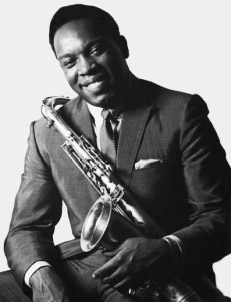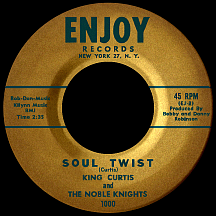KING CURTIS
AND THE NOBLE KNIGHTS
Soul Twist
Early in his career, jazz saxophonist King Curtis decided he should prioritize the pop and rhythm and blues fields, having noted how many talented musicians on New York's jazz scene seemed content to play the clubs for standard wages and make occasional jazz recordings that usually had modest sales. While continuing to work occasional club dates, he spent far more time doing studio sessions, his impressive skill keeping him busy. By 1957, with several records under his own name and countless uncredited R&B and rock and roll sides embossed with his tenor sax sound, he participated in the recording of a number one hit: "Yakety Yak" by The Coasters. Music insiders (and, later, fans) came to recognize the rapid-note style as his own "yakety sax" trademark.
Curtis Ousley (born Curtis Montgomery and later adopted) was raised in the Forth Worth area. He discovered his calling in 1945 at the age of eleven; all it took was hearing a few songs on the radio by Louis Jordan to trigger a lifelong obsession. Gene Ammons, a saxophonist and R&B hitmaker, was an early favorite. Within a year, Curtis had two saxes of his own: one alto, one tenor, and he preferred the latter. He formed a group with a few high school friends and began performing around town, eventually gigging at small clubs despite being underage; some weeks he made over 200 dollars, more money than any of the adults he knew were earning. The nonstop gigging and incessant practicing, always trying different techniques, gave him a well-rounded knowledge of the instrument and by the time he visited his uncle in New York, fresh out of high school in 1952, he was ready to give it a go. An Apollo Theater amateur night win secured several weeks of work with the Harlem club's backing band.
Upon returning to Texas with a plan to attend college on a scholarship he'd been granted, word got out that Lionel Hampton, who was appearing in Fort Worth, had lost his tenor man. Curtis skipped school, auditioned and spent the next three months on the road with Hamp's band. Once they rolled into N.Y., he decided to stay. In 1956, Jesse Stone, a singer, songwriter and A&R director for RCA's Groove label, produced "Movin' On," a tune written with pianist George Rhodes that became the first of more than 60 singles by King Curtis over the next 15 years (not counting all the records that featured his playing). Many sessions followed as he often alternated with prolific tenor player Sam "The Man" Taylor. King Curtis releases in '57 include "King's Rock" on Apollo and two on DeLuxe: "Steel Guitar Rag" and "Wicky Wacky."
He'd begun performing at Small's Paradise, a popular Harlem nightclub since the '20s, and became a solid draw, appearing there regularly over a span of several years. Stone, a producer for Atlantic Records by '58, frequently hired Curtis; the sax man's contribution to "Yakety Yak" (particularly the rigorous 31-second solo at the song's midpoint) ultimately gained him an iconic status. Other hits he played on around that time include "A Lover's Question" by Clyde McPhatter and similarly-constructed smashes "What Am I Living For" by Chuck Willis and LaVern Baker's career peak, "I Cried a Tear." Several instrumental singles (and an album) came out under K.C.'s name on the company's Atco label in '58 and '59, starting with "The Birth of the Blues," credited to King Curtis and his Royal Men. He called on some of New York's hottest musicians, including another tenor sax man, Noble "Thin Man" Watts, guitarists Jimmy Spruill and Al Casey, bassist Jimmy Lewis, pianist Herman Foster and drummer Samuel "Belton" Evans. Four additional singles (without mention of the Royal Men) include a frantic original, "Ific."
Leaving Atlantic in 1960, Curtis waxed sides for any label that was interested, among them ABC-Paramount, Everest (as The King Curtis Combo) and lesser-known imprints like Sky-Rocket (as The Strolls featuring King Curtis), Seg-Way and Tru-Sound. "Soul Meeting" featured pianist Wynton Kelly and trumpeter Nat Adderley; issued as an album on Prestige, its title track was on a New Jazz 45, the first of many, many songs by Curtis with the world "soul" in the title. In early '62 he appeared on the Enjoy label (owned by Fire/Fury founder Bobby Robinson) with a song that combined his buzz word with the hottest trend of the time. The result: "Soul Twist," an infectious track, though perhaps no better or worse than other recent output. Yet the timing was right and the single (produced by Bobby and his brother, Danny Robinson), with a strong guitar lead-in by Billy Butler (whose main claim-to-fame was co-writing Bill Doggett's '56 smash "Honky Tonk"), caught on quickly, riding high in April '62 in the pop top 20 and at number one on the R&B charts. Just like that!

Suddenly famous, Curtis received star billing on the Scepter album The Shirelles and King Curtis Give a Twist Party; one track, "Love is a Swingin' Thing," appeared on the flip side of the girl group's number one hit "Soldier Boy" (though Curtis went uncredited on the single). The Enjoy label follow-up to his hit, "Wobble Twist," was issued that summer (a few months later "Wiggle Wobble," a variation of the tune by bandleader-pianist Les Cooper and his group The Soul Rockers, also produced by the Robinsons, became a top 30 hit). Curtis, using the clout his big single had given him, signed with a major label, Capitol, his debut 45 arriving that summer, concurrent with the Enjoy sequel; "Beach Party" (with a comparable title, but not the sound, of typical beach/surf recordings) made a respectable mid-chart showing. Jumping on another dance craze (successfully exploited by Major Lance and The Miracles), his single "Do the Monkey" (with vocals: 'Monkey, do the monkey...monkey...monkey!' etc.!) unsurprisingly stalled near the bottom of the charts in the summer of '63.
"Soul Serenade" was the one Capitol recording that had a hit sound, offering something new: Curtis played the saxello (similar to a soprano sax) and the result was smooth as silk. Composed with Scepter A&R man Luther Dixon, the song had a disappointing mid-chart run in early 1964, but is considered among Curtis's best. Overall, he was unhappy with what he called "by the book" producers and arrangers, so after his Capitol contract was up in 1966 he returned to Atlantic, where producers like Jerry Wexler were always game for experimentation. "Spanish Harlem" happened by adding Curtis's sax solo to the original backing track for Ben E. King's five-year-old hit. In early 1967, he received his first Grammy nomination for the effort, in the category Best Rhythm and Blues Group Performance, Vocal or Instrumental.
In between backing Atlantic stars Aretha Franklin, Solomon Burke and Don Covay in the studio, to name just a few, Curtis reached the charts with more than a dozen songs over the next few years, mostly with covers of popular hits (among them "I Was Made to Love Her," "(Sittin' On) The Dock of the Bay," "Valley of the Dolls," "I Heard it Through the Grapevine" and "Harper Valley P.T.A."). His peak hit during this time (pop top 40, R&B top ten, summer '67) was an original, "Memphis Soul Stew," which had him calling out the contributions of each individual musician, climaxing with a cookin' finale. Hot on its heels came a more surprising top 40 entry, a cover of Bobbie Gentry's "Ode to Billie Joe," credited to The Kingpins. His many popular recordings established him as the star instrumentalist among Atlantic's top-of-the-line studio players. In March 1970 he won a Grammy on his second try, scoring in the Best Rhythm and Blues Instrumental Performance category for his version of Joe South's "Games People Play." Two more Grammy nominations came within the next three years...but Curtis wasn't around to bask in the glory.
Working nonstop into 1970, and loving every minute, he recorded "Teasin'" with Atco artists Delaney Bramlett, Eric Clapton and Friends and rocked out with a soul-injected take on Led Zeppelin's "Whole Lotta Love." His album Live at Fillmore West had been recorded over the course of three Aretha-headlined shows in March 1971 that featured long opening sets (with extended versions of "Soul Serenade" and "Memphis Soul Stew") by Curtis and his Kingpins, among them organist Billy Preston, guitarist Cornell Dupree and drummer Bernard "Pretty" Purdie. In July 1971, he joined John Lennon to record two tracks for the Imagine album ("It's So Hard," also the flip side of the hit single, and "I Don't Wanna Be a Soldier"). The "King" was living it up!
Then during an August heat wave as Curtis was entering his brownstone home on West 86th Street in Manhattan, he had a run-in with two men who were taking drugs and blocking his way. It happened in an instant: one of them had a knife...and stabbed him in the heart. By the time an ambulance arrived at the hospital, he had died. News of the tragedy spread quickly. The public was stunned. His funeral was held four days later with Reverend Jesse Jackson delivering the eulogy. Many of music's great stars attended. Wexler, Ahmet Ertegun and the other Atlantic staffers were numbed by the loss of their friend. His son, Curtis Ousley, Jr., was left without a father. A random, senseless murder robbed King Curtis of a full life and deprived the world of at least a few more decades of great instrumental saxophone music.


